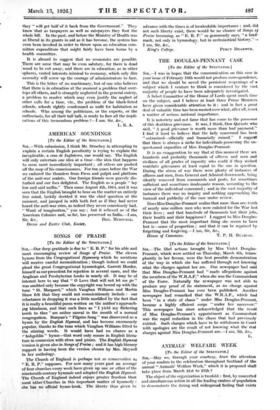SONGS OF PRAISE
[To the Editor of the Srze-reeoa.] IStn,—Our deep gratitude is due to " E. B. P." for his able and most encouraging review of Songs of Praise. The eleven hymns from the Congregational Hymnary which he mentions will receive careful reconsideration ; though indeed we could plead the great Congregational hymnologist, Garrett Horder, himself as our precedent for rejection in several cases, and the Anglican and Presbyterian books in nearly all. It may be of interest here to say that " 0 Love that will not let me go " was omitted only because the copyright was bound up with the tune " St. Margaret," which Vaughan Williams and Martin Shaw felt that they could not conscientiously include : our reluctance in dropping it was a little modified by the fact that it is really a beautiful poem written on the author's approach- ing blindness, and that such lines as " I yield my flickering torch to thee " are rather unreal in the mouth of a normal congregation. Bunyan's " Pilgrim Song " was discovered as a hymn by the English Hymnal, and has become enormously popular, thanks to the tune which Vaughan Williams fitted to the stirring words. It would have had no chance as a hobgoblin" hymn—that word only comes in English litera- ture in connexion, with elves and pixies. The English Hymnal version is given also in Songs of Praise ; and it has high literary support in having been the version chosen by Mrs. Meynell in her anthology.
The Church of England is perhaps not so conservative as " E. B. P." supposes. For now many years past an average of four churches every week have given up one or other of the nineteenth-century hymnals and adopted the English Hymnal. The Church of England indeed enjoys greater freedom than most other Churches in this important matter of hymnody : she has no official hymn-book. The liberty thus given to advance with the times is of incalculable importance : and, did not such liberty exist, there would be no chance of Songs of Praise becoming, as " E. B. P." so generously says, " a land- mark, not only in hymnology, but in ecclesiastical history."— I am, Sir, &c.,






























































 Previous page
Previous page